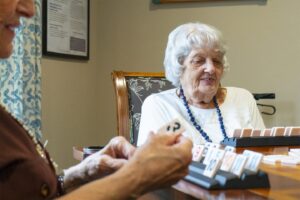The pandemic has resulted in a new crop of seniors becoming even more sophisticated and avid users of the internet and social media platforms. When the days of isolation rolled into weeks, months, and now over a year, seniors were forced to become part of the technology-savvy generation. Bloomberg reported after just two months into the pandemic, “the ‘New Normal’ for many older adults is on the Internet … and expanded tech literacy is a new skill that may stay with them long after lockdowns lift.” At Victoria Landing Assisted Living and Memory Care, Melbourne, FL’s only waterfront assisted living facility, we applaud seniors for utilizing technology to remain independent and connected with family, friends, and even care providers through telemedicine-type appointments for routine health matters. We also know there are precautions that should be taken to ensure safety online. Check out the information below that we have compiled from SecureFlorida.org and the Florida Department of Law Enforcement (FDLE) to protect you and your loved ones from cybercriminals and scammers targeting seniors. According to the FDLE, the following is a list of common senior scams that may impact older Floridians. Some of these senior scams affect a wide range of age groups but are particularly impactful to the elderly, as scammers work to deceive victims or leverage technology against them. (www.secureflorida.org)
Romance Scam
A romance scam is a practice of misrepresenting oneself in an online romantic relationship with the intent of scamming someone out of money or information. While the internet helps to bridge the gap over long distances, it has also made it easier than ever to change a person’s appearance and hide their real intentions. Scammers using this scheme will work to make a victim grow feelings for them and then ask them for money (usually under the guise of legal trouble, car trouble, an investment opportunity that seems too good to be true, or for a ticket to come to see the victim). A lot of times, the potential suitor is located outside the United States. Not all internet romance is fake, but you should take care when sharing sensitive information with someone who you cannot physically see. Be suspicious of requests for money or access to financial accounts.
Telemarketing Senior Scams
Not all marketing calls are senior scams, but some will take your money without giving you anything in return. The U.S. Department of Justice estimates that fraudulent telemarketing takes about $40 billion from victims every year and affects nearly one in six Americans. Of that number, nearly 80% are 50 or older. You can avoid most of these senior scams by screening your phone calls (using either Caller ID or your voicemail).
Social Security Scam
Scammers know that seniors often collect benefits from Social Security. These bad actors target seniors by calling them claiming to be an agent of the Social Security Administration. The scammers then inform the victim that their social security number has been revoked, canceled, or is under investigation. The scammers may ask the victim to provide their social security number for verification (and then steal their identity) or to pay a fee in order to resolve the issue. If you have questions about your benefits, the status of your social security number, or other disputes, contact the Social Security Administration directly at 1 (800) 772-1213.
Grandparent Scam
This particularly insidious scam preys on the familial ties between grandparents and their grandchildren. A scammer calls a grandparent (or other family members) and tells them one of two scenarios: • Their grandchild has been injured and is in the hospital. The hospital is doing all they can to save their grandchild but needs money upfront (frequently required to be paid in gift cards) in order to start treatment. • Their grandchild has been arrested and is in jail. In order to get out of jail, they must be bailed out (frequently requiring the fee to be paid in gift cards). The caller tells the victim not to call family, that they have either already been notified or the grandchild does not want to get in trouble. In either situation, the grandparent is told that it is urgent and payment must be made now or very soon. In some cases, they tell the victim that a lawyer, doctor, or police officer can explain the situation to them and gives them a number to call. This third party, whether the victim contacts the number or not, lends the appearance of authority to the person on the call. Victims are sometimes chosen at random, but oftentimes they are not. Victims are usually people who have been victimized before, whose personal information has been leaked somewhere, or whose social media is easily visible on the internet. The scammer may also call late at night since the victim is more likely to act impulsively when they have just woken up and told of an emergency. If you receive a call, take a step back and do not panic. Assess the situation. Do not give in to requests to keep this a secret; hang up the phone and call a relative with access to the grandchild in question (their parents, guardian, a close friend, etc.) and inquire about their well-being. A hospital will not require payment upfront in emergencies, and if your grandchild is in jail, they are not going anywhere until they are bailed out. To help protect yourself, check the privacy settings on your social media to make sure you are not giving away too much information to just anyone on the internet. Ensure that only friends and family can see your posts and your family pictures.
Home Repair Scam
In this scam, scammers (usually working in teams of two or more) canvass neighborhoods with older residents, knocking on doors to inform the occupants that something in the home needs fixing. Usually, they are routine repairs such as a hole in the roof, a clogged pipe, or gutter work. The scammers demand payment up front and then say that after further inspecting the problem, it is more serious and will require more work (and more money). If they do any work to “repair” the problem, the work is usually low quality because the scammers are unlicensed. In a variation of this scam, one scammer works to distract the homeowner while another enters the home to steal money and valuables. Most reputable home contractors will not approach you about repairs to your home. If someone shows up on your doorstep claiming to be a contractor who noticed that you have some work that needs to be done, thank them for the information and shut the door. If you think your home needs repairs, research a quality licensed contractor and have them come out for an inspection. Most will offer quotes for free and will be upfront about payment plans. Lastly, never let a contractor distract you while his companion disappears. Consider having a friend or family member present to help keep an eye out and to also make sure you are not being manipulated.
Be Vigilant But Not Afraid to Prevent Senior Scams
Because this is such an important topic, we will dedicate a future blog to specific safety measures seniors and families can take to protect their finances and identity online. At Victoria Landing Assisted Living and Memory Care, our seniors receive that extra special attention from our professional and compassionate staff to ensure they always feel mentally, physically, and technology safe. Visit our beautiful assisted living facility located in Melbourne, FL on the serene banks of the Indian River where you will find special incentives to help your loved ones fulfill a secure, physical, and mental wellness lifestyle with dignity, grace, and reverence. For a limited time, we are waiving the standard $3,000 assisted living community fee and paying for your loved one’s move-in costs up to $500. Learn how Brevard County’s premier assisted living community provides happiness, health, and heart for our seniors like no other. Let us customize the perfect “Aging in Place” for your beloved family member.


